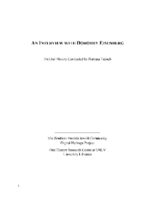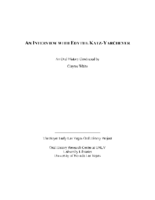Search the Special Collections and Archives Portal
Search Results

Transcript of interview with Marilyn Glovinsky and Melissa Lemoine by Barbara Tabach, April 2, 2015
Date
Archival Collection
Description
Marilyn Glovinsky discusses her upbringing in New York and moving to Las Vegas. She was involved in establishing Congregation Ner Tamid. Her daughter, Melissa, talks about growing up in Las Vegas and attending Hebrew Academy.
Marilyn Glovinsky was born January 20, 1942 in Brooklyn, New York, the daughter of a teacher, Lilyan, and police sergeant, Solomon Goldberg. Marilyn split her childhood between New York City and Los Angeles, where she spent the summers with her maternal grandparents. In 1963, she graduated with a bachelor?s degree in speech pathology from Brooklyn College. A year later she married, and the couple soon moved to Salt Lake City, where her husband had been hired as a graduate assistant at the University of Utah. In Salt Lake City, Marilyn worked as a first grade teacher. It was there that she attended her first High Holidays service, at the Reform synagogue. It wasn?t long before her husband enlisted in the United States Navy, and they were stationed Camp Legeune, North Carolina, for nearly three years. The couple later moved back to Utah, where their children Melissa and David were born. In June of 1974, Marilyn and her family moved to Las Vegas. She quickly integrated herself into the Jewish community, and was amongst a small group of families that started Congregation Ner Tamid. She went on to play a critical role in the growth of the synagogue, including taking on an interim operations management role at one time, and also leading the development of the Hebrew School, to tremendous success. Marilyn?s daughter has emulated her mother?s dedication to making Judaism accessible to members of the local community, particularly through education and social activities. Even as a fifth grader at the Hebrew Academy, Melissa took on additional responsibilities, assisting in the school office. Now, in addition to her job as a teacher at Doral Academy, Melissa teaches b?nai mitzvah, conversion and Hebrew School classes at Ner Tamid. She also leads programming for NextGen, a group dedicated to creating community amongst young Jewish adults in their 20s and 30s. Melissa is married to Todd Lemoine, and they have one child named Colton.
Text
Audio clip from interview with Marilyn Glovinsky and Melissa Lemoine, April 2, 2015
Date
Archival Collection
Description
Marilyn Glovinsky talks about growing up Jewish in New York "without thinking about it," and the decision to send her daughter to Hebrew School in Las Vegas.
Sound

Transcript from interview with Sari and Paul Aizley by Barbara Tabach, November-December, 2015
Date
Archival Collection
Description
Paul and Sari Aizley discuss their many accomplishments as residents of Las Vegas, including those in education and with Jewish Family Service Agency.
Text
Audio clips from interview with Dr. Ed Goldman, April 4, 2016
Date
Archival Collection
Description
In these audio clips, Dr. Goldman recalls attending services as Temple Beth Sholom, and the effort to get more minorities, including Jews, hired in Clark County School District.
Sound

Transcript of interview with David and Iris Torjman by Barbara Tabach, November 12, 2015
Date
Archival Collection
Description
In this interview, the Torjmans recall meeting at Temple Beth Sholom and their careers in Las Vegas. David Torjman was a Hebrew School teacher at Temple Beth Sholom, and later became a dealer at the Rainbow Club and Tropicana. Iris was a health aide for the Clark County School District.
In 1964, a young Hebrew school teacher was recruited to teach at Temple Beth Sholom. Soon he met Iris Schwartz who had moved to Las Vegas to live with her aunt. Less than two years later David proposed to Iris in Jack Entratter's suite at the Sands; had a New York wedding and then a local wedding thrown by the Sisterhood at Temple Beth Sholom. The couple came from distinctively different Jewish backgrounds. David was born and raised in Morocco and was educated in trades at the ORT Vocational School in Fez, Morocco. He then studied at Sunderland Talmudical College in England before immigrating to the United States. Iris was a native of Bronx, New York. And tells how before the couple met in Las Vegas that they actually lived within blocks of each other in New York. She moved to Las Vegas to live with relatives as a young woman. In 1964 destiny brought them together. David?s career as a Hebrew school teacher brought him to Temple Beth Sholom, a career that lasted for three years. He then worked for Jerry Hory?s Hock Shop and later became a dealer for the Rainbow Club and the Tropicana. Iris worked for the Clark County School District as a health aide. They have been successful investors in local property and enjoy their retirement. They tell the story of meeting and creating a life in Las Vegas where they raised their three children.
Text

Transcript of interview with Carolyn Goodman by Barbara Tabach, August 18, 2016
Date
Archival Collection
Description
Carolyn Goldmark Goodman (1939- ) is the mayor of the city of Las Vegas, Nevada. She began her first four-year term in office on July 6, 2011 and was re-elected for a second term in April 2015. She succeeded her husband of 50 years, Oscar B. Goodman, who served three terms as mayor. Carolyn founded The Meadows School in Las Vegas in 1984, the state's first nonprofit, college preparatory school for pre-kindergarten through 12th grade. She oversaw planning and daily operations of the school for 26 years, retiring in 2010. Carolyn and Oscar Goodman arrived in Las Vegas in 1964. Carolyn Goodman started out working in the hotel industry, and later earned her master's degree in counseling from the University of Nevada, Las Vegas (UNLV) while raising four children. As mayor, Goodman has focused on improving public education and the local economy. She is a board member of the Las Vegas Convention and Visitors Authority and serves on the Las Vegas Global Economic Alliance (LVGEA). She is actively involved in the United States Conference of Mayors (USCM), as a member of its Advisory Board, vice-chair of its Task Force on Education Reform, and chair of the Mayors? Business Council. In 2014 Goodman received the UCSM?s Large City Climate Protection Award. As leader of the Meadows School, Goodman was recognized nationally by the Council for Advancement and Support of Education (CASE) and the National Association of Independent Schools in 2006 with the Seymour Preston Trustee Award for Leadership. She has also been honored by UNLV, receiving the Distinguished Nevada award in 1989, an Honorary Doctor of Laws degree (PhD) in 2006, and Alumni of the Year in Education in 2010. In this interview, Goodman talks about her family background and touches upon her childhood in New York City and attending Bryn Mawr College, where she met Oscar. She discusses the growth of the Las Vegas Jewish population since arriving, efforts to build Jewish community, and her involvement, including with Temple Beth Sholom and the Jewish Federation. In addition, Goodman talks at length about her husband?s political career as well as her own, both dedicated to developing Las Vegas into a safe and prosperous city, with quality education, health care, and arts and culture offerings. She also discusses establishing The Meadows School.
Text

Transcript of interview with Dorothy Eisenberg by Barbara Tabach, October 23, 2014
Date
Archival Collection
Description
Interview with Dorothy Eisenberg by Barbara Tabach on October 23, 2014. In this interview, Eisenberg discusses her upbringing on the east coast and becoming a widow with four children. She met her second husband at a synagogue, and they moved to Las Vegas for a fresh start. Eisenberg became involved with Temple Beth Sholom, and the Las Vegas League of Women Voters. She has a school named after her in the Clark County School District.
Dorothy Eisenberg is a first generation American, with roots in Ukraine and Central Europe, and grew up in Philadelphia. Judaism was a significant part of Dorothy's life from the beginning, and both her and her brother spent many of their afternoons at Hebrew school and most weekends at Shabbat services as adolescents. Eisenberg moved to Las Vegas with her children and second husband in 1964. She became an influential member of the community and served as the Jewish Federation of Las Vegas's first female president. She was also actively involved in the League of Women Voters of Las Vegas Valley, including leading the organization's advocacy for school desegregation and serving as its president for two years.
Text

Transcript of interviews with Edythe Katz-Yarchever by Claytee White, 2000-2005
Date
Archival Collection
Description
Transcript of interviews with Edythe Katz-Yarchever by Claytee White over the course of several sessions in 2000, 2003 and 2005. In the interviews, Katz-Yarchever discusses her life in Las Vegas, owning theaters with her husband, Lloyd Katz, and the strides they made in civil rights. She talks about her service in Civil Defense and the National Guard, and moving to various places, then working in California and meeting her husband, Lloyd. The Katzes became involved in the community in various ways with Operation Independence and Holocaust education. About a decade after Lloyd's death, Edythe married Judge Gilbert Yarchever.
Edythe Katz-Yarvhever was born in Boston, a second generation American whose grandparents left Russia the century before. Edythe completed finishing school at the start of World War II and worked various jobs at home before joining the Civil Defense, and later, the National Guard. She moved to Maryland and got a job as a secretary at Edgewood Arsenal, then transferred to Cushing General Hospital to assist a Marine Corps neurologist, who was also a Jewish refugee. Towards the end of the war, she is transferred to an Army hospital in Hawaii, and thus began the rest of her life on the West Coast. When the war ended, Edythe sailed to California and worked various jobs in Los Angeles: in the secretarial pool at MGM Studios, for a casting agency and for a hotel magazine. Edythe met Lloyd Katz in San Francisco, and the two were married after a short courtship. The couple lived in San Francisco before moving to Las Vegas in 1951, where they took over the management of the Huntridge, Palace and Fremont theaters, then leased by Edythe's parents. The Katzes took a stand to desegregate their theaters, allowing black customers to sit with white patrons. Edythe and Lloyd became active in the city's Civil Rights Movement, including work with Operation Independence and the NAACP. Edythe started organizations like Volunteers for Education and Junior Art League, and directed an interfaith, interracial preschool. Lloyd would frequently open up their theaters to organizations to hold fundraisers, free-of-charge. Edythe was extremely active in the local Jewish community, including opening the city's first Jewish gift shop, serving as sisterhood president at her synagogue and starting the Jewish Reporter. She later founded a library for Holocaust education as well as assisted the school district's development of curriculum and teacher training relating to the Holocaust. Lloyd Katz passed away in 1986, and in 1995, Edythe married Gilbert Yarchever. Edythe and Lloyd's community service work was honored with the naming of their school, the Edythe and Lloyd Katz Elementary School, where Edythe still remains active.
Text
Audio clip from interview with Lynn Leshgold Rosencrantz by Barbara Tabach, January 7, 2016
Date
Archival Collection
Description
Part of an interview with Lynn Leshgold Rosencrantz on January 7, 2016. In this clip, Rosencrantz discusses relocating to Las Vegas and teaching education.
Sound
Minutes from Temple Beth Sholom Board of Directors meetings, January 1957 - April 1963
Date
Archival Collection
Description
The meeting minutes of the board of directors of Temple Beth Sholom, then known as the Jewish Community Center of Las Vegas, Inc., include the proceedings of meetings held from 1957 to 1963.
Text
